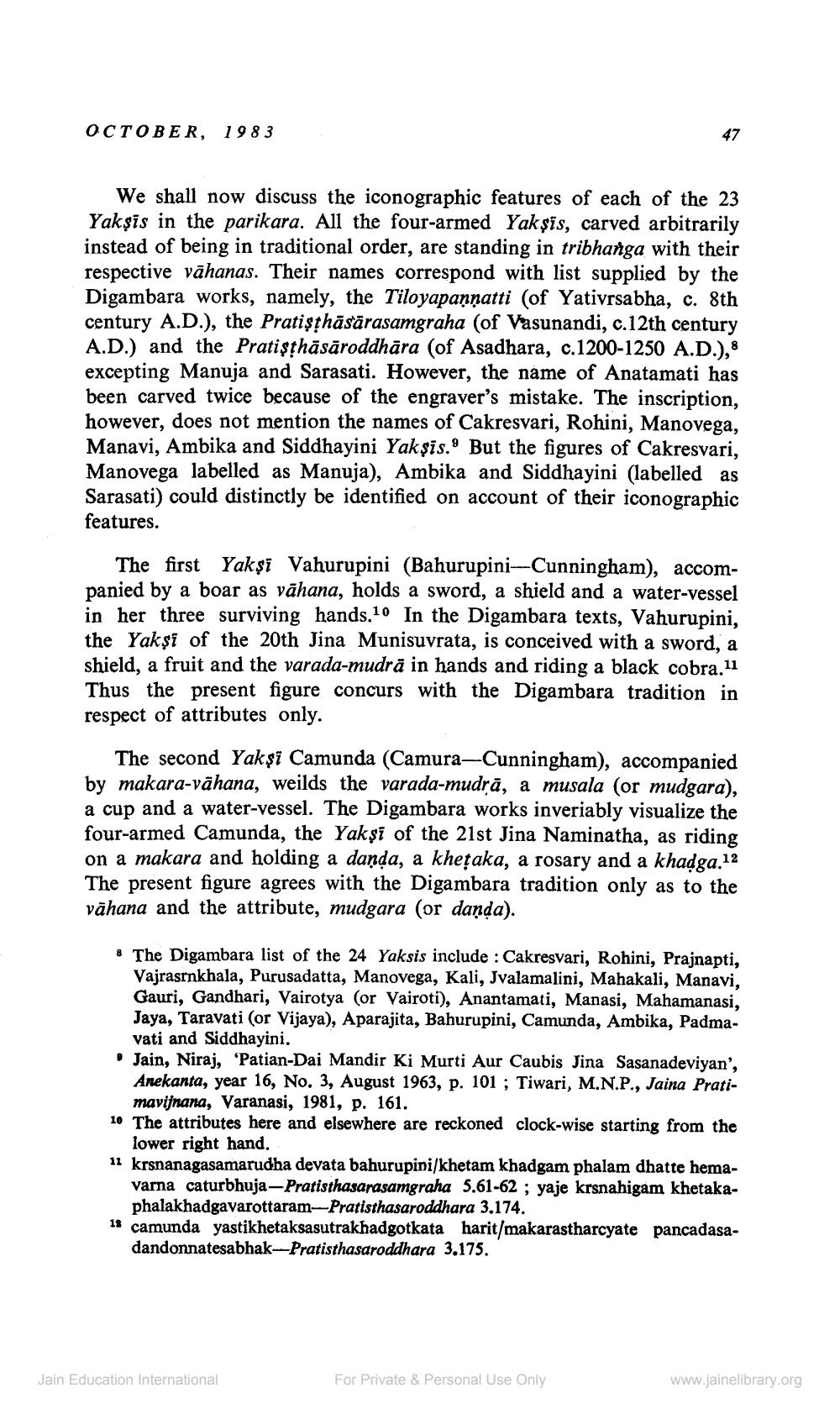________________
OCTOBER, 1983
We shall now discuss the iconographic features of each of the 23 Yaksis in the parikara. All the four-armed Yaksis, carved arbitrarily instead of being in traditional order, are standing in tribhanga with their respective vāhanas. Their names correspond with list supplied by the Digambara works, namely, the Tiloyapannatti (of Yativrsabha, c. 8th century A.D.), the Pratişthāsārasamgraha (of Vasunandi, c. 12th century A.D.) and the Pratisthāsāroddhāra (of Asadhara, c.1200-1250 A.D.), 8 excepting Manuja and Sarasati. However, the name of Anatamati has been carved twice because of the engraver's mistake. The inscription, however, does not mention the names of Cakresvari, Rohini, Manovega, Manavi, Ambika and Siddhayini Yakşis.9 But the figures of Cakresvari, Manovega labelled as Manuja), Ambika and Siddhayini (labelled as Sarasati) could distinctly be identified on account of their iconographic features.
The first Yakşi Vahurupini (Bahurupini-Cunningham), accompanied by a boar as vāhana, holds a sword, a shield and a water-vessel in her three surviving hands.10 In the Digambara texts, Vahurupini, the Yakşi of the 20th Jina Munisuvrata, is conceived with a sword, a shield, a fruit and the varada-mudră in hands and riding a black cobra 11 Thus the present figure concurs with the Digambara traditio respect of attributes only.
The second Yakşi Camunda (Camura-Cunningham), accompanied by makara-vähana, weilds the varada-mudrā, a musala (or mudgara), a cup and a water-vessel. The Digambara works inveriably visualize the four-armed Camunda, the Yakși of the 21st Jina Naminatha, as riding on a makara and holding a danda, a kheţaka, a rosary and a khadga 12 The present figure agrees with the Digambara tradition only as to the vāhana and the attribute, mudgara (or danda).
8 The Digambara list of the 24 Yaksis include : Cakresvari, Rohini, Prajnapti,
Vajrasrnkhala, Purusadatta, Manovega, Kali, Jvalamalini, Mahakali, Manavi, Gauri, Gandhari, Vairotya (or Vairoti), Anantamati, Manasi, Mahamanasi, Jaya, Taravati (or Vijaya), Aparajita, Bahurupini, Camunda, Ambika, Padmavati and Siddhayini. Jain, Niraj, 'Patian-Dai Mandir Ki Murti Aur Caubis Jina Sasanadeviyan', Anekanta, year 16, No. 3, August 1963, p. 101 ; Tiwari, M.N.P., Jaina Prati
mavijnana, Varanasi, 1981, p. 161. 10 The attributes here and elsewhere are reckoned clock-wise starting from the
lower right hand. 11 krsnanagasamarudha devata bahurupini/khetam khadgam phalam dhatte hema
varna caturbhuja-Pratisthasarasamgraha 5.61-62 ; yaje krsnahigam khetaka
phalakhadgavarottaram---Pratisthasaroddhara 3.174. 18 camunda yastikhetaksasutrakhadgotkata harit/makarastharcyate pancadasa
dandonnatesabhak-Pratisthasaroddhara 3.175.
un
Pratisthadhraha 5.61-62.gam phalam di
Jain Education International
For Private & Personal Use Only
www.jainelibrary.org




